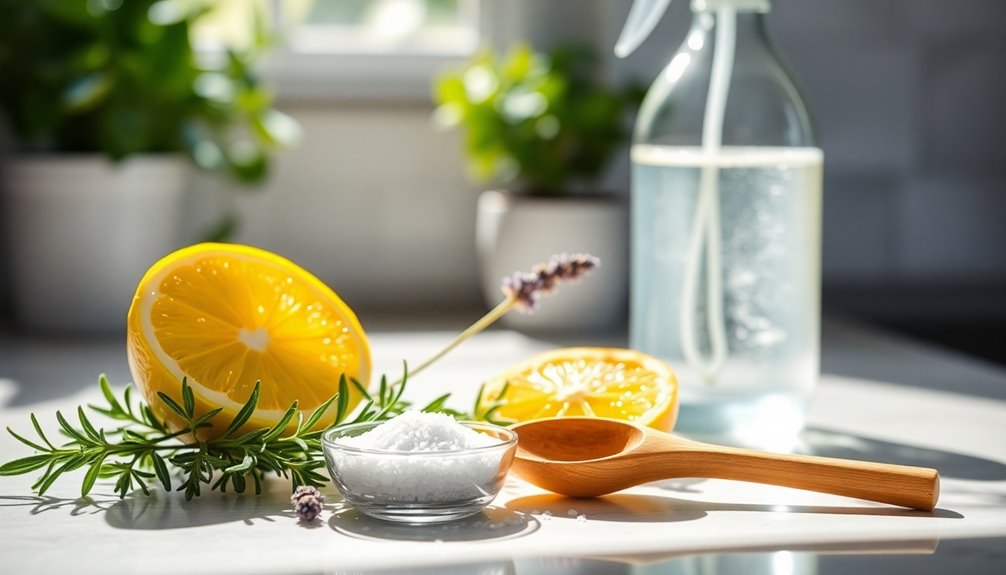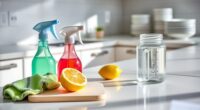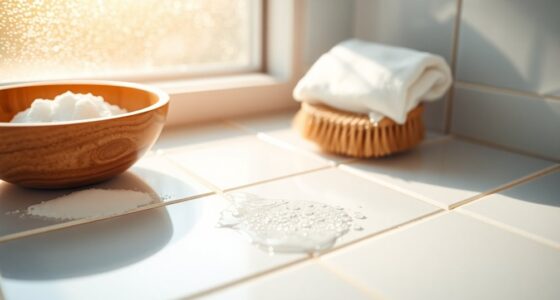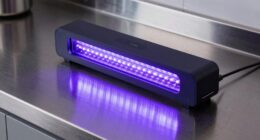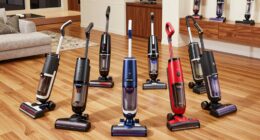For effective home cleaning, you should consider natural disinfectants like white vinegar, lemon, hydrogen peroxide, hot water, and alcohol. White vinegar breaks down bacteria and neutralizes odors, while lemon offers antimicrobial properties and a fresh scent. Hydrogen peroxide is powerful against germs and leaves no harmful residues. Hot water acts as a disinfectant too, and alcohol effectively dismantles germ cell walls. Want to discover more about using essential oils and commercial natural cleaners? Keep exploring!
Key Takeaways
- White vinegar, with its acetic acid, effectively breaks down bacteria and neutralizes odors for various cleaning tasks.
- Lemon's citric acid offers powerful antimicrobial properties and fresh scent, making it ideal for stain removal and odor elimination.
- Hydrogen peroxide is a versatile disinfectant that leaves no harmful residues and is effective against bacteria, viruses, and fungi.
- Hot water at 140-150 degrees Fahrenheit enhances cleaning efficacy and is safe for children and pets without leaving harmful residues.
- Alcohol concentrations between 60-90% effectively dismantle germ cell walls, providing a strong disinfecting option for home surfaces.
Why Should I Use Natural Disinfectants?
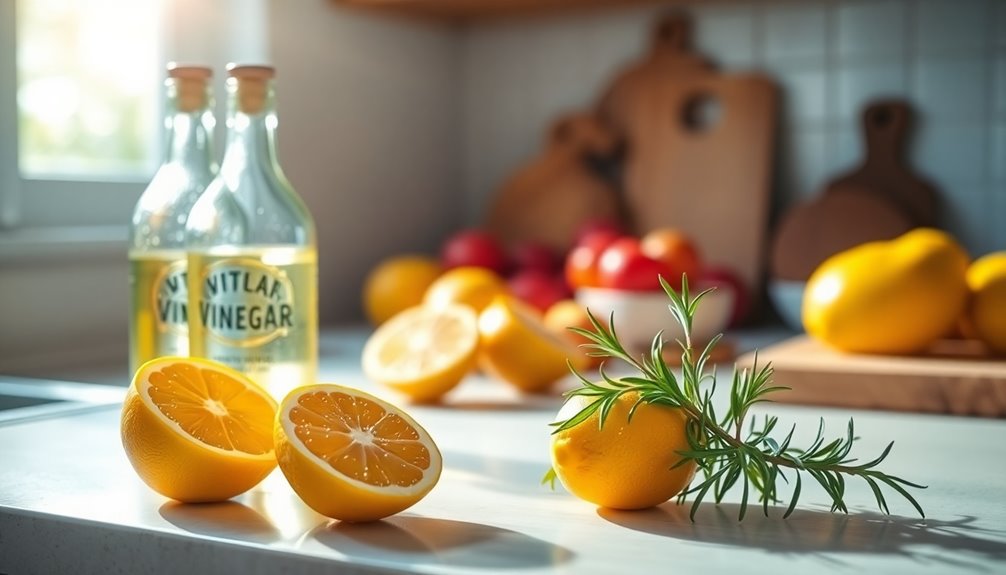
When you choose natural disinfectants for your home, you're not just opting for a cleaner space; you're also protecting your family's health.
By using eco-friendly options, you minimize chemical exposure, reducing health risks for both humans and pets. Natural disinfectants like white vinegar and hydrogen peroxide effectively break down bacteria and viruses without harmful toxins.
Opting for eco-friendly disinfectants minimizes chemical exposure, ensuring a healthier home for both your family and pets.
Plus, many essential oils, such as tea tree and lavender, boast antimicrobial properties that enhance cleaning while leaving behind pleasant aromas.
These solutions are also made from biodegradable ingredients, contributing positively to the environment and cutting down on plastic waste.
For families with young children or individuals prone to allergies, natural disinfectants offer a safer alternative that protects sensitive skin from harsh irritants. Additionally, using natural remedies can complement your cleaning routine by providing additional layers of protection against germs.
1 White Vinegar
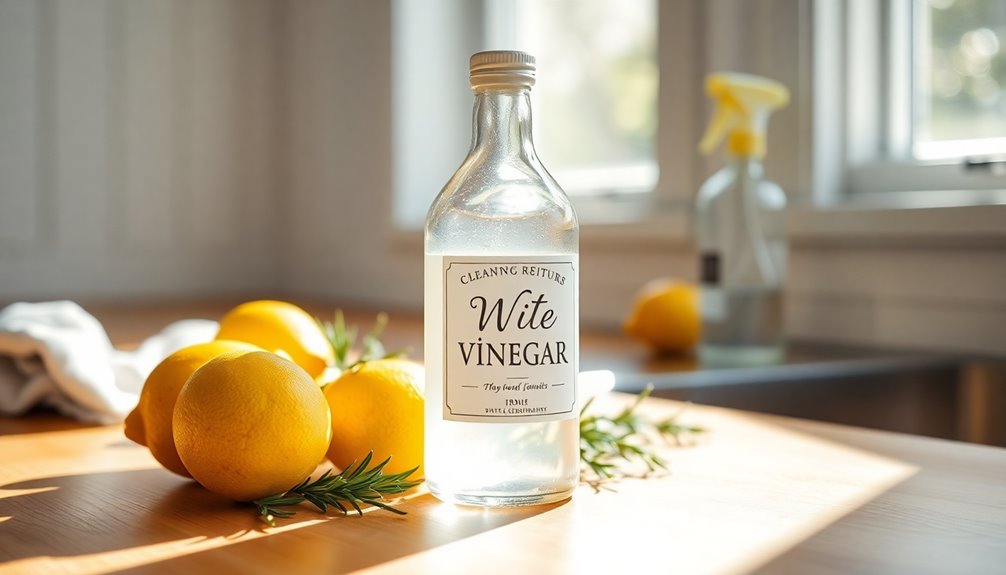
White vinegar's cleaning effectiveness comes from its acetic acid, which breaks down bacteria and eliminates odors.
You can easily incorporate it into your cleaning routine, whether in your laundry or for mopping floors.
Plus, using it with dish soap enhances your dishwashing, making your utensils both clean and disinfected. Additionally, incorporating the four-box method for decluttering can create a more organized environment while you clean.
Cleaning Effectiveness
Though many cleaning products promise to tackle tough messes, white vinegar stands out for its impressive effectiveness as a natural disinfectant. Its high acetic acid content gives it powerful natural disinfecting properties, making it ideal for various surfaces in your home.
You can create a simple cleaning solution by mixing ½ cup of white vinegar with a gallon of water, perfect for cleaning floors while easily removing dirt and grime. If you add dish soap, you'll enhance its cleaning power, effectively cutting through grease and food residue.
Don't forget, adding ½ cup of white vinegar to your laundry can help eliminate odors and brighten garments, ensuring they're clean and disinfected. Air purifiers can further assist in maintaining a clean environment by removing airborne contaminants. Stick to white vinegar for the best results!
Odor Neutralization
Because of its ability to break down odor-causing bacteria, white vinegar is a powerful ally in neutralizing unwanted smells around your home. This natural, eco-friendly deodorizer can easily replace synthetic air fresheners, making it safer for homes with pets and children.
For effective cleaning, add ½ cup of white vinegar to your laundry to eliminate stubborn odors and brighten your garments. When mopping floors, mix ½ cup of white vinegar with a gallon of water to refresh surfaces while removing unpleasant smells.
If you're tackling odors in your garbage disposal, combine lemon with white vinegar for a fresh scent. Embracing white vinegar for odor neutralization not only keeps your home smelling great but also supports a healthier environment.
2 Lemon
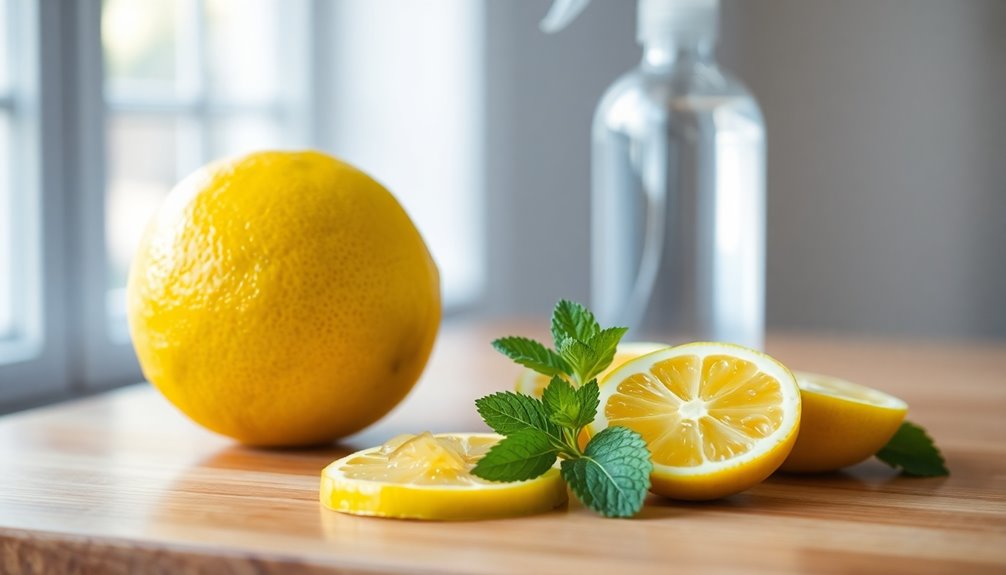
Lemon's antimicrobial properties make it a powerful ally in your cleaning routine, effectively tackling bacteria and viruses.
You'll love how its fresh scent neutralizes odors, creating a pleasant atmosphere in your home.
Plus, when it comes to stubborn stains, lemon juice can break down tough grime, giving your surfaces a sparkling clean. Additionally, using lemon as a natural disinfectant can help reduce exposure to harmful airborne pathogens, promoting respiratory health.
Antimicrobial Properties Unleashed
When you're looking for a natural disinfectant, lemon stands out due to its powerful antimicrobial properties. The citric acid in lemon juice doesn't just disinfect surfaces; it also breaks down grime and acts as a natural stain remover.
You can use lemon in various ways to enhance your cleaning routine:
- Create a cleaning spray by mixing lemon juice with water.
- Use lemon halves dipped in salt as an exfoliating scrub for stubborn stains.
- Simmer lemon peels to freshen up your kitchen.
- Apply lemon juice directly on fabric stains for effective removal.
- Rely on its naturally occurring properties to kill bacteria and viruses.
Additionally, lemon essential oil has antibacterial properties that can further enhance its effectiveness as a disinfectant. With lemon, you've got one of the best natural solutions for a cleaner, fresher home.
Odor Neutralization Techniques
Harnessing the power of lemon not only aids in disinfecting surfaces but also excels at neutralizing odors throughout your home.
When you use lemon juice or lemon halves in your garbage disposal, you eliminate unpleasant smells and freshen the kitchen environment.
For a natural air freshener, simmer lemon slices in water on the stove to release a delightful aroma that masks unwanted odors.
Combining lemon with salt creates an effective scrub, perfect for removing stains and odors from cutting boards and countertops.
The fresh scent of lemon enhances your cleaning and disinfecting routine, making it one of the best organic cleaning options. Additionally, lemon's natural acidity helps to neutralize bacteria, further enhancing its cleaning properties.
Embrace lemon as a natural cleaner to create a more inviting atmosphere and truly clean your home.
Stain Removal Solutions
A powerful stain removal solution lies in the natural properties of lemon. With its antimicrobial benefits, lemon juice serves as an effective natural cleaner and disinfecting agent. The citric acid acts as a bleaching agent, making it perfect for tackling stubborn stains on textiles and surfaces.
- Apply fresh lemon juice directly on stains and let it sit for 10-15 minutes.
- Combine lemon juice with baking soda to create a paste for tough stains.
- Rub a halved lemon on stained areas for deodorizing.
- Use lemon juice on countertops and cutting boards for a clean finish.
- Freshen your garbage disposal by placing lemon halves inside.
Harness the cleaning power of lemon for a cleaner, fresher home! Additionally, using eco-friendly practices such as burning only dry, seasoned firewood is crucial for maintaining a healthy home environment.
3 Hydrogen Peroxide
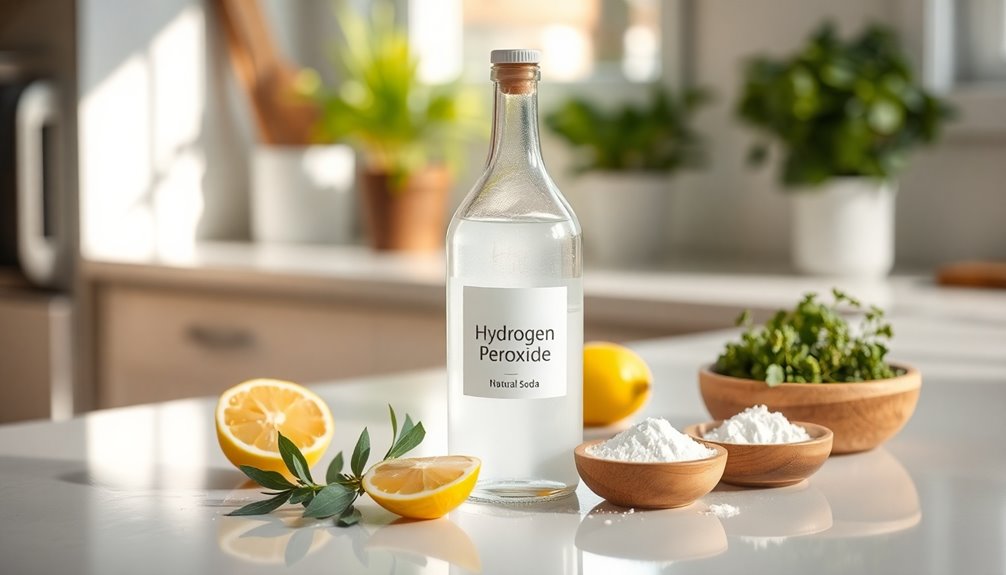
Hydrogen peroxide stands out as a versatile and powerful natural disinfectant for your home.
It's effective against bacteria, viruses, and fungi, making it an excellent choice for various household cleaning tasks. Typically available in a 3% concentration, you can use hydrogen peroxide directly on tough stains or dilute it with water for surface cleaning.
As a non-toxic alternative to chemical disinfectants, it breaks down into water and oxygen, leaving no harmful residues behind. To guarantee effective disinfection, let it sit on surfaces for about 1 to 10 minutes before rinsing if needed. Additionally, the use of sustainable practices in cleaning products is gaining popularity, reflecting a commitment to health and environmental safety.
Just remember to store hydrogen peroxide in a cool, dark place and avoid mixing it with vinegar or other chemicals to prevent harmful reactions.
4 Hot Water
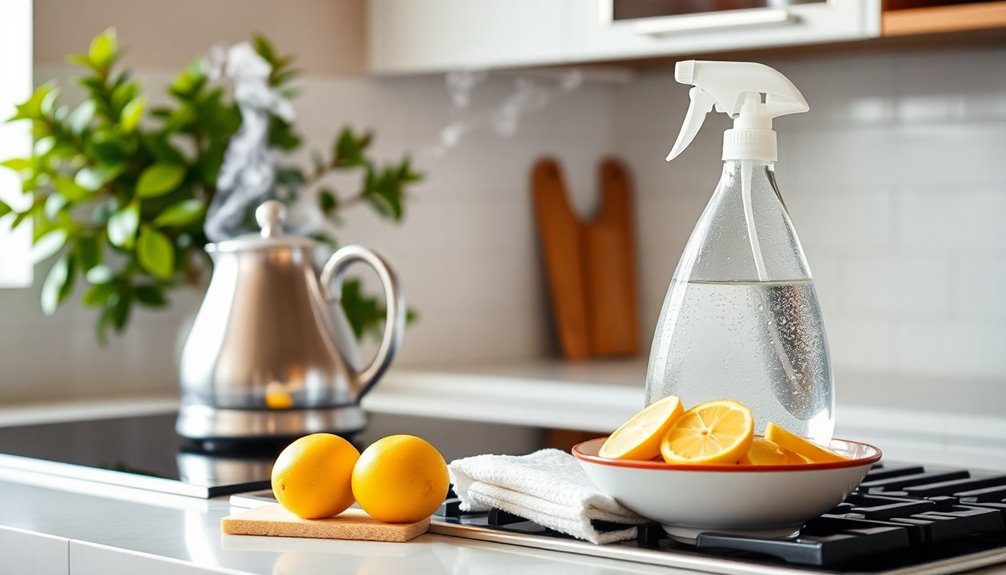
Hot water serves as a powerful natural disinfectant that can effectively eliminate harmful bacteria from various surfaces.
Hot water is a potent natural disinfectant, effectively ridding surfaces of harmful bacteria.
When you use boiling water at suitable temperatures of 140-150 degrees Fahrenheit, you'll see just how effective it can be in your cleaning routine. It enhances the potency of other cleaning agents and is especially useful for deep cleaning laundry, dishes, and cutting boards.
Plus, it's a safe and non-toxic option, leaving no harmful residues behind—perfect for households with kids and pets. Additionally, using hot water in conjunction with food preservation techniques can help sanitize utensils and surfaces after handling raw produce.
- Ideal for deep cleaning
- Works well with oxidizing agents
- No harmful residues
- Non-toxic and safe
- Requires protective gloves and goggles
Embrace hot water as a reliable ally in your cleaning arsenal!
5 Alcohol
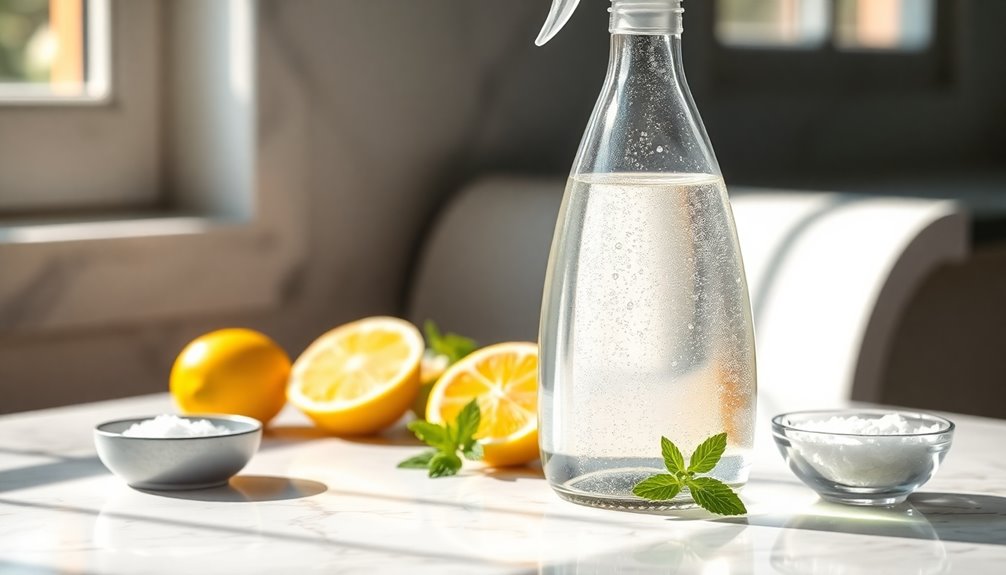
When it comes to natural disinfectants, alcohol stands out as a powerful option for keeping your home clean and germ-free. At concentrations between 60-90%, alcohol effectively dismantles the cell walls of germs, making it a potent cleaner.
You can easily create DIY cleaners by mixing rubbing alcohol with common household ingredients like dish soap and vinegar. The CDC recommends using at least 70% rubbing alcohol for ideal disinfection against various pathogens.
Alcohol's versatility allows you to disinfect surfaces such as windows, mirrors, and chrome fixtures, leaving them streak-free. Plus, it helps eliminate bad odors from laundry, making it a dual-purpose cleaning agent. Regular cleaning of surfaces with alcohol can enhance your overall air quality indicators, ensuring a healthier home environment.
6 Essential Oils

Essential oils offer a natural and aromatic way to disinfect your home. Oils like tea tree oil and lavender oil are packed with strong antimicrobial properties, making them effective against bacteria, viruses, and fungi.
Essential oils provide a natural and fragrant method to disinfect your home, effectively combating bacteria, viruses, and fungi.
You can easily create a DIY spray with tea tree oil by mixing about 30 drops with water, targeting a wide range of pathogens. Lavender oil not only disinfects but also adds a soothing scent, enhancing your cleaning experience.
Here are some essential oils to reflect on:
- Tea tree oil: Powerful antimicrobial properties
- Lavender oil: Disinfectant with a calming aroma
- Peppermint oil: Slows bacterial growth
- Eucalyptus oil: Fresh scent and disinfectant
- Lemon oil: Natural antibacterial and revitalizing scent
Combining these with other natural disinfectants boosts their effectiveness!
Clean Your Home Naturally With Archipelago
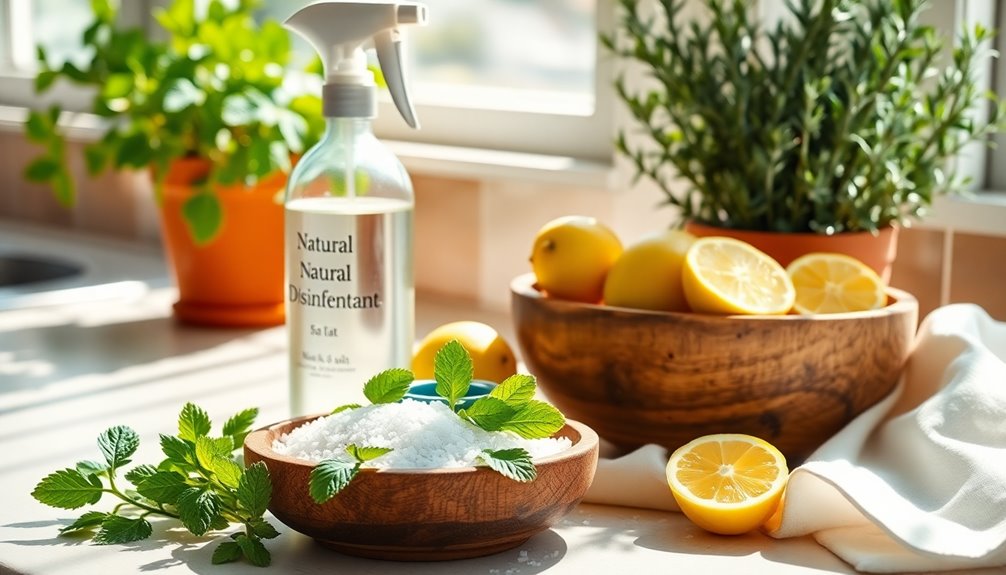
If you're looking for an effortless way to clean your home naturally, Archipelago offers a fantastic solution. Their range of natural cleaners is ready-to-use, so you won't need to spend time measuring or mixing.
Formulated with eco-friendly ingredients like lavender, mint, and citric acid, Archipelago products provide a pure cleaning experience that promotes a healthier indoor environment. You can choose from kitchen soap, laundry detergent, and multi-purpose disinfectants, all designed to keep your home fresh.
Plus, the antimicrobial properties of essential oils not only enhance cleanliness but also leave your space smelling delightful. By opting for Archipelago, you're making a positive choice for eco-sustainability while steering clear of harmful chemicals often found in conventional cleaning products.
Frequently Asked Questions
What Is the Most Powerful Natural Disinfectant?
When you're looking for the most powerful natural disinfectant, hydrogen peroxide stands out.
It's effective against a wide range of pathogens, including bacteria and viruses, especially at a 3% concentration.
Alcohol, particularly isopropyl alcohol in the 70-90% range, is another strong contender, breaking down germ cell walls.
Essential oils like tea tree oil and vinegar also offer impressive disinfecting properties.
Combining these options can enhance your cleaning routine, ensuring a safe environment.
How Can I Sanitize My House Naturally?
To sanitize your house naturally, you can use a combination of simple ingredients.
Mix equal parts white vinegar and water for a powerful disinfectant. Apply 3% hydrogen peroxide directly to surfaces for effective germ-killing.
Lemon juice not only disinfects but also adds a fresh scent. Enhance your solution with essential oils like tea tree or lavender.
Finally, use hot water between 140-150 degrees Fahrenheit to further eliminate bacteria on various surfaces.
What Is the Best Disinfectant to Clean Your House With?
Cleaning your house is like whipping up a rejuvenating potion to banish germs. For the best disinfectant, consider hydrogen peroxide; it's a powerhouse against bacteria and viruses.
White vinegar's acetic acid works wonders for floors and laundry odors. Alcohol, especially in higher concentrations, effectively sanitizes surfaces.
Don't forget essential oils, which add a lovely scent while boosting your cleaning strength. Hot water can also help, especially when combined with these natural agents.
Is Vinegar or Hydrogen Peroxide a Better Disinfectant?
When deciding between vinegar and hydrogen peroxide as a disinfectant, you'll find hydrogen peroxide is generally the better choice.
It effectively kills a wider range of pathogens, including bacteria, viruses, and fungi. While vinegar can break down some bacteria, it's not as powerful.
If you're looking for thorough sanitization, stick with hydrogen peroxide at a 3% concentration.
Just remember, don't mix them together, as they'll cancel each other out and lose effectiveness.
Conclusion
By embracing natural disinfectants, you're not just cleaning your home; you're inviting a refreshing change into your sanctuary. Each ingredient—vinegar, lemon, hydrogen peroxide—acts like a trusty knight, battling germs and grime without the harsh chemicals. As you wipe down surfaces, imagine the vibrant energy of nature flowing through your space, leaving it sparkling and safe. So, roll up your sleeves and let these natural warriors transform your home into a haven of health!

